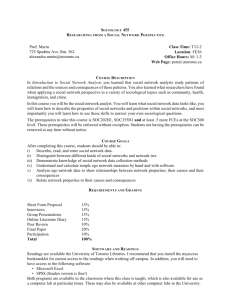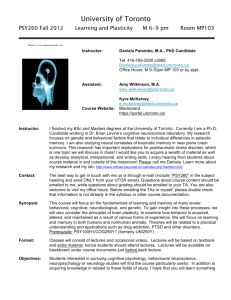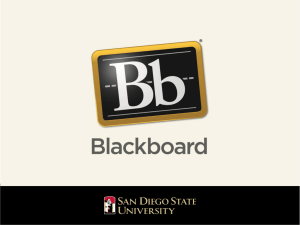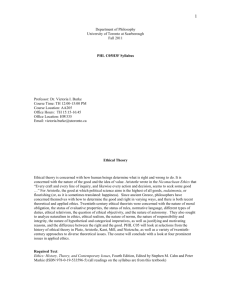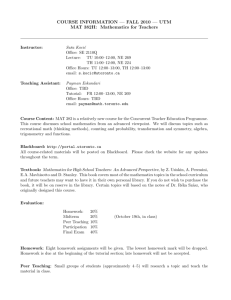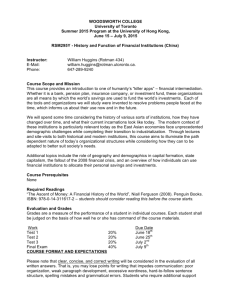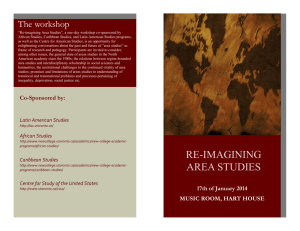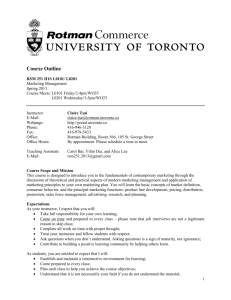Syllabus - School of the Environment
advertisement
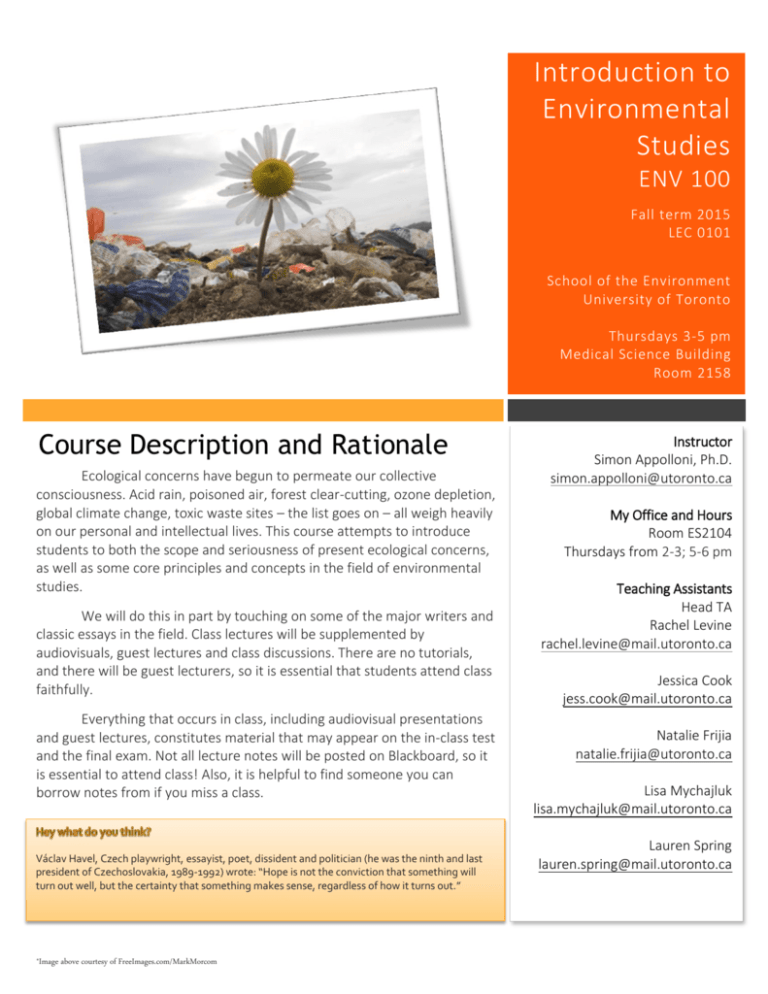
Introduction to Environmental Studies ENV 100 Fall term 2015 LEC 0101 School of the Environment University of Toronto Thursdays 3-5 pm Medical Science Building Room 2158 Course Description and Rationale Ecological concerns have begun to permeate our collective consciousness. Acid rain, poisoned air, forest clear-cutting, ozone depletion, global climate change, toxic waste sites – the list goes on – all weigh heavily on our personal and intellectual lives. This course attempts to introduce students to both the scope and seriousness of present ecological concerns, as well as some core principles and concepts in the field of environmental studies. We will do this in part by touching on some of the major writers and classic essays in the field. Class lectures will be supplemented by audiovisuals, guest lectures and class discussions. There are no tutorials, and there will be guest lecturers, so it is essential that students attend class faithfully. Everything that occurs in class, including audiovisual presentations and guest lectures, constitutes material that may appear on the in-class test and the final exam. Not all lecture notes will be posted on Blackboard, so it is essential to attend class! Also, it is helpful to find someone you can borrow notes from if you miss a class. Václav Havel, Czech playwright, essayist, poet, dissident and politician (he was the ninth and last president of Czechoslovakia, 1989-1992) wrote: “Hope is not the conviction that something will turn out well, but the certainty that something makes sense, regardless of how it turns out.” *Image above courtesy of FreeImages.com/MarkMorcom Instructor Simon Appolloni, Ph.D. simon.appolloni@utoronto.ca My Office and Hours Room ES2104 Thursdays from 2-3; 5-6 pm Teaching Assistants Head TA Rachel Levine rachel.levine@mail.utoronto.ca Jessica Cook jess.cook@mail.utoronto.ca Natalie Frijia natalie.frijia@utoronto.ca Lisa Mychajluk lisa.mychajluk@mail.utoronto.ca Lauren Spring lauren.spring@mail.utoronto.ca 2 Course Objectives The course is intended as a broad-based introduction to the study of the environment. The objectives of the course are: 1) to provide students with a “functional literacy” in some of the foundational ideas and concepts in the study of the environment; 2) to help students gain a greater knowledge of, and appreciation for, the sundry ecological challenges confronting the planet; 3) to create an educational atmosphere that is respectful, challenging, engaging, and informative; and 4) to help students learn to think critically about environmental issues, and to express their ideas clearly and effectively. Course Material A compiled set of readings, which every student is required to obtain, is available at The Copy Place, 720 Spadina Ave., Suite 103, Toronto (half a block south of Bloor, near the Beer Store; enter building, go to the end, and turn right), 416-961-2679: 720thecopyplace@hotmail.ca ). Supplementary readings (available online) will also be used. Blackboard Students are responsible for having a valid, working UTORid and for gaining access to the course website on Blackboard (BB) (http://portal.utoronto.ca/). All documents and resources for the course will be accessible through the course website. Always check “Content” and “Announcements” for the latest updates to the course. You must use your utoronto email address to receive course information from the Blackboard website. Course Evaluation Reflection Paper Test (1.5 hours) Final Exam Oct. 18 (via Turnitin) Oct. 29 (at Exam Centre) Dec. Exam Period 30% 30% 40% Both the test and exam will include an essay component and short answer component which will be discussed in class. The test covers Weeks 1- 6. The exam covers all material. | ENV100 Introduction to Environmental Studies Course Syllabus 2 3 The reflection paper (roughly 3 pages double-spaced, only digital version needed), will have you reflect and write upon one of three questions where you will relate course theory and content to an issue or theme in environmental studies. A separate sheet giving the questions and details about the assignment will be handed out in the third week of the course. You will be asked to hand in your work through Turnitin*. The work will be marked accordingly (weighted in ascending order): Marking Criteria The primary criteria used in evaluating the reflection paper are the following (in ascending order of importance): 1. Mechanics: Your work must be completely free of grammatical errors, spelling errors or major factual errors. References can be in any style but the same format must be used consistently and they must be accurate. 2. Writing style: Your work should be written in a clear and unambiguous style which assists, rather than impedes, communication with the reader. 3. Structure: Your writing should have a clear focus, provided by the reflection question, and a structure which logically flows from that focus. 4. Precision and accuracy: Precision means saying exactly and specifically what you mean, avoiding ambiguity and vague generalities. Accuracy refers to absence of major factual errors. 5. Analysis: Your analysis should display understanding of the topic and, based on that understanding, originality of thought. *Students will normally be required to submit their course essays to Turnitin.com for a review of textual similarity and detection of possible plagiarism (procedures and codes for doing this will be passed on to students by email). In doing so, students will allow their essays to be included as source documents in the Turnitin.com reference database, where they will be used solely for the purpose of detecting plagiarism. The terms that apply to the University's use of the Turnitin.com service are described on the Turnitin.com web site. However, should students choose not to use the Turnitin.com service, they will be required to submit all rough work (all notes demonstrating original drafts). Only submit a hard copy if you are NOT using the Turnitin.com service. Academic integrity Academic integrity is fundamental to learning and scholarship at the University of Toronto. Participating honestly, respectfully, responsibly, and fairly in this academic community ensures that the U of T degree that you earn will be valued as a true indication of your individual academic achievement, and will continue to receive the respect and recognition it deserves. Familiarize yourself with the University of Toronto’s Code of Behaviour on Academic Matters (http://www.governingcouncil.utoronto.ca/policies/behaveac.htm). It is the rule book for academic behaviour at the U of T, and you are expected to know the rules. Potential offences include, but are not limited to: In papers and assignments: Using someone else’s ideas or words without appropriate acknowledgement Copying material word-for-word from a source (including lecture and study group notes) and not placing the words within quotation marks o (The above two bullets refer to plagiarism. If you are in doubt about how to avoid plagiarism, speak to your Head TA or instructor after you read: http://www.writing.utoronto.ca/advice/using-sources/how-not-to-plagiarize) Submitting your own work in more than one course without the permission of the instructor (in a sense, a form of self-plagiarism as you are misrepresenting your own work) | ENV100 Introduction to Environmental Studies Course Syllabus 3 4 Making up sources or facts Including references to sources that you did not use Obtaining or providing unauthorized assistance on any assignment including: o working in groups on assignments that are supposed to be individual work o having someone rewrite or add material to your work while “editing” o Lending your work to a classmate who submits it as his/her own without your permission On tests and exams: Using or possessing any unauthorized aid, including a cell phone Looking at someone else’s answers Letting someone else look at your answers Misrepresenting your identity Submitting an altered test for re-grading Online Communication Policy All communication amongst students, instructor and TAs will be conducted in a respectful manner. Please allow a full 48 hours for a response to any email, though I generally try to respond to emails within 24 hours. For administrative questions concerning the course, please direct your inquiries to the Head TA. However, for best results, please direct ALL such course inquiries – those of a NON-personal nature – to the course discussion board on Portal BB, where Ms Levine will check in to answer questions at least once daily. Please also consider visiting the discussion board weekly to catch up on any tips or learn from Ms Levine’s answers to your colleagues’ questions. You can also feel free to answer your colleagues’ questions or add to that thread with additional questions of related concern. For matters of a personal nature (illness, emergency), rather than using the discussion board, do email Ms Levine. She will return your emails within 24 hours. The best ways to contact me, the instructor, and to ask questions are in class and at scheduled office times. You can also arrange an appointment outside of my regular office hours. Emails should not be used as an alternative to meeting with the instructor during office hours. Emails to me or any of the TAs should not be used to seek information that is readily available on the course syllabus or website (refer to cartoon above!). Use email as a professional tool of correspondence. Always place the Course Name and Course Number in the subject heading of your email. Directly address the instructor or TA by name, and always provide your own (full) name as part of your message. Emailing directly through the course’s Blackboard site will ensure reception. Feedback Blog Tool As part of the communication process AND the learning process, I welcome and actively encourage your feedback on your comprehension of course lessons and/or content. With 500 students, asking questions – and getting them answered fully – in class can be difficult. To make this communication/learning process easier, you are welcome, after class each week, to go to our Blackboard to communicate to me about the lesson’s topic: something that was either not clear (the “Muddiest Point”) and/or something that really made you think, or surprised you (the “Dude Awesome”). THIS IS NOT A SITE FOR EVALUATIONS OR CRITIQUES. You may build on what someone else said or enter your own communication. Entries may be anonymous. I may or may not answer/respond through the blog; however, I will read them and use them to help me understand better how concepts and points are getting across. To access this blog, simply go to BB under “Tools”/ “Blog” where you will see “Muddiest Point/Dude Awesome.” They will run weekly. Try to keep the communication brief and to the point. | ENV100 Introduction to Environmental Studies Course Syllabus 4 5 Accessibility Students with diverse learning styles and needs are welcome in this course! In particular, if you have a disability/health consideration that may require accommodations, please feel free to approach the Head TA and/or Accessibility Services at (416) 978 8060; accessibility.utoronto.ca. Late Policy No due dates will be extended. Penalty for late work will be 2% of the assignment mark per day late, including weekends. The only exemption from this penalty will be for work which is late for health reasons, if a University of Toronto Student Medical Certificate is provided or other personal reasons, with documentation provided from a College Registrar or Accessibility Services (see documentation deemed “official” by the Faculty below). Missed Tests / Re-marking Policy – Timeline and Protocol Make-ups for missed tests will be reserved only for reasons of illness or personal or medical emergency. The make-up tests will occur later in the term at the discretion of the Head TA. Students should contact the Head TA, Ms Levine, as soon as possible to make the necessary arrangements. All requests must be accompanied by appropriate types of medical documentation deemed “official” by the Faculty: the UofT Verification of Illness or Injury Form, available to students online; the Student Health or Disability Related Certificate; a College Registrar’s Letter (from a senior authorized staff member); an Accessibility Services Letter. Letters should be submitted to the Head TA no later than one week after returning to class. If the student does not come forward with one week, the Head TA or the instructor may consider a request to extend the deadline, but is under no obligation to do so. Should you wish your test paper to be remarked for a miscalculation of marks, please see the Head TA. For concerns about the marking of tests or reflection paper, please discuss the matter first with the TA who marked your work (look for her initials/name on your work). You may not simply request that the whole work be reexamined merely because you feel the mark is too low. You must specify to the TA exactly which part(s) require reexamination, outlining coherently reasons why the section deserves a re-examination. Please note that in reexamining the work, the TA is free to lower the mark if she deems it merits it. If unsatisfied with your mark, it is ONLY after you have met and discussed your work with the TA who marked your work that you can come to the instructor with your concerns. Important Dates October 9 October 29 November 8 December 11-22 Examination timetable for F section code courses posted Class test to be held at Exam Centre Last day to drop F section code courses from academic record and GPA Final Exam Period | ENV100 Introduction to Environmental Studies Course Syllabus 5 6 Course Outline (all readings found in course package or, where specified, online) Week One (Sep. 17) Introduction: Why Study the Environment? We will go over course requirements and goals and begin the semester by discussing the terms of the course and some dimensions of the so-called environmental crisis, climate change, and the “Anthropocene.” We will also view part of the documentary “Rachel Carson’s Silent Spring.” Week Two (Sep. 24) What Is an Education for in Our Ecological Moment? Readings: David Orr, “What Is Education For?,” from Earth in Mind: On Education, Environment, and the Human Prospect. Washington, D.C.: Island Press, 2004, pp. 7-15. Thomas L. Friedman “Without Water, Revolution,” The New York Times, May 18, 2013, available at: http://www.nytimes.com/2013/05/19/opinion/sunday/friedman-without-waterrevolution.html?pagewanted=all&_r=0 and http://www.nytimes.com/2012/04/08/opinion/sunday/friedman-the-other-arab-spring.html Week Three (Oct.1) The Being of Sustainability Readings: Henry David Thoreau, “Walking,” (Parts 1 & 2) from the Thoreau Reader. Monty Hempel, “Ecoliteracy: Knowledge Is Not Enough,” from The Worldwatch Institute’s State of the World 2014: Governing for Sustainability. Washington: Island Press, 2014, pp. 41-52. Week Four (Oct. 8) The Doing of Sustainability Readings: Aldo Leopold, “The Land Ethic,” from A Sand County Almanac. New York: Oxford University Press, 1949, pp. 201-226. Stephen Scharper, “The Ethics of Organic Farming,” in For Earth’s Sake: Toward a Compassionate Ecology [henceforth FES] ed. Simon Appolloni. Toronto: Novalis, 2013, pp. 151153. Scharper, “The Gulf of Mexico Oil Spill: Would the Precautionary Principle Have Averted This Disaster?” in FES, pp. 115-120. Week Five (Oct. 15) What about the Other-than-human Animals? Reading: Michael Fox, “Agriculture, Livestock, and Biotechnology: Values, Profits, and Ethics,” in A Communion of Subjects: Animals in Religion, Science and Ethics, edited by Paul Waldau and Kimberely Patton. New York: Columbia University Press, 2006, pp. 556-567. (Oct. 18) **Reflection Paper due on this Sunday, at 11:45 pm – to be loaded to Turnitin.com** Week Six (Oct. 22) Climate Change: The Role of Environmental Science We will have a guest lecture for the second part of the class: Bob McDonald, host of CBC’s Quirks and Quarks via Skype. Readings: Daniel Sarewitz, “Science and Environmental Policy: An Excess of Objectivity.” In Earth Matters: The Earth Sciences, Philosophy and the Claims of Community, edited by Robert Frodeman. New Jersey: Prentice–Hall, 2000, pp. 79-98. | ENV100 Introduction to Environmental Studies Course Syllabus 6 7 Week Seven (Oct. 29) Test **Not in class – at Exam Centre 255 McCaul Street** Week Eight (Nov. 5) Indigenous Knowledge and Approaches to the Environment We will have a guest lecture for this class: Dr. Deborah McGregor from Aboriginal Studies, UofT Reading: Dr. Deborah McGregor, “Traditional Knowledge: Considerations for Protecting Water in Ontario.” The International Indigenous Policy Journal 3, no. 3, 2012, pp. 1-21. Week Nine (Nov. 12) What Is the Gaia Theory? Readings: James Lovelock, Gaia: A New Look at Life on Earth, New York: Oxford University Press, 1979, pp. vii-12. Scharper, “The Gaia Theory,” in FES, pp. 68-82. Week Ten (Nov. 19) Putting the Eco Back in Economics We will have a guest lecture for this class: green economist, Dr. Peter Victor from York University Reading: Peter Victor, “Questioning Economic Growth: Our Global Economy Must Operate within Planetary Limits to Promote Stability, Resilience and Wellbeing, Not Rising GDP.” Nature 468, no. 7322 (November 18, 2010): 370-71. Week Eleven (Nov. 26) Shifting Standpoint: Eco-feminism Readings: Vandana Shiva (in interview), “Thinking Eco-feminism.” In Talking Environment: Vandana Shiva in Conversation with Ramin Jahanbegloo. New Delhi: Oxford University Press, 2013, pp. 46-66. Ramin Jahanbegloo, “Globalizing Dissent,” (as introduction to the above), pp. xi-xvi. Scharper, “Poor Bear Burden of Environmental Hazards,” in FES, pp. 41-43. Week Twelve (Dec. 3) Conclusion: Final Wrap up and Exam Review Readings: David Orr, “Slow Knowledge,” Conservation Biology 10, No. 3 (Jun., 1996), pp. 699-702. Scharper, “On Sacrifice, Spirituality, and Silver Linings,” in FES pp. 172-174. Did you know that according to the IPCC Fifth Assessment Report, "In presently dry regions, the frequency of droughts will likely increase by the end of the 21st century"? Image courtesy of scottchan at FreeDigitalPhotos.net | ENV100 Introduction to Environmental Studies Course Syllabus 7
